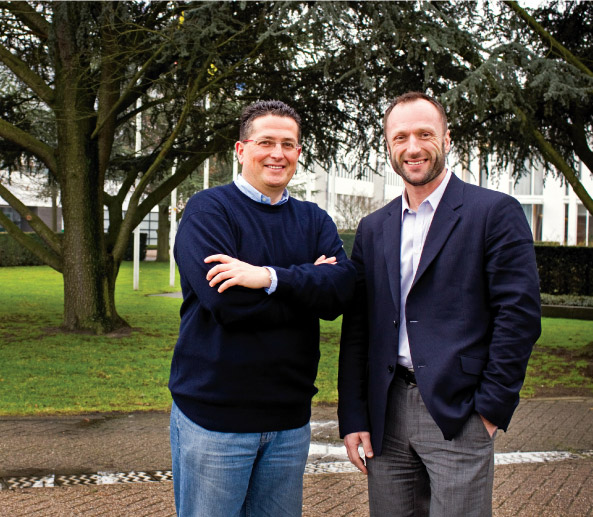
COMMITTED TO RESEARCH With a passion for scientific research, Ramon Polo (left) and Brian Woodfall are working to develop telaprevir for hepatitis C. Like others at Tibotec in Belgium, they’re driven by the knowledge that their efforts have the potential to not only improve health but help people survive.
Hope for Patients With Infectious Diseases
As a researcher working on hepatitis C clinical trials around the world, Brian Woodfall, M.D., is only too aware of the challenges patients face. Many endure yearlong drug treatments only to have to undergo a liver transplant or even die from complications related to the blood-borne virus.
“Many people don’t tolerate the current drugs very well and feel sick,” says Woodfall, Vice President of Global Clinical Development for Tibotec Pharmaceuticals.“ And at the end of the treatment, so many people aren’t cured.” The current standard treatment may be successful in less than 50 percent of patients who have the most prevalent form of hepatitis C, and there are no alternative medicines for those who don’t respond.
About 170 million people worldwide are infected with hepatitis C, with 3 to 4 million new cases each year, according to the World Health Organization. It is a common cause of cirrhosis of the liver, liver cancer and liver transplants worldwide.
INNOVATIVE TREATMENTS AIM TO CURE MORE PATIENTS
To meet this critical need, Tibotec Pharmaceuticals is developing two new treatments for hepatitis C. The drugs, telaprevir and TMC435*, have the potential to cure significantly more people than currently available therapies and to halve patients’ treatment time, from 12 months to six. Telaprevir was named one of the top 10 medical innovations for 2011 by the Cleveland Clinic. It is now undergoing review by the U.S. Food and Drug Administration and the European Medicines Agency. TMC435 is being evaluated globally in several large Phase III trials.
“These drugs will potentially decrease patients’ time away from work and family, and get them back to improved health faster,” Woodfall says. “Our research is driven by an intense commitment to save lives and improve patients’ health on a day-to-day basis.”
R&D EXPANDS IN INFECTIOUS DISEASES
The hepatitis C medicines are among the treatments that the Infectious Diseases and Vaccines Therapeutic Area is developing to address high unmet medical needs globally. Already a world leader in HIV medicines, the franchise is developing new treatments for tuberculosis (TB) and HIV, and has partnered with Crucell N.V. to develop an influenza treatment and vaccine. In February 2011, Johnson & Johnson completed its tender offer for Crucell, which develops vaccines against infectious diseases worldwide. As a result, Crucell will now operate as the center for vaccines within the Pharmaceuticals group.
“We are developing more effective treatments for infectious diseases to improve the lives of millions of people around the world,” says Paul Stoffels, M.D., Worldwide Chairman, Pharmaceuticals. “In addition to our growing research and development in infectious diseases,” he adds, “we will have a greater impact on improving human health globally with our expansion into prevention as we build our vaccines pipeline, particularly in emerging markets.”
BREAKTHROUGH TREATMENTS
One of the world’s oldest and most deadly infectious diseases, tuberculosis kills 1.8 million people a year. Company researchers’ work in TB has been groundbreaking, and for the first time in more than 40 years, a new class of drugs potentially effective against TB has been discovered. Now in clinical trials, the treatment, TMC207, will initially target the increasing number of patients who have failed tuberculosis therapies due to drug resistance. Tibotec has partnered with the nonprofit Global Alliance for Tuberculosis Drug Development, which will conduct studies of TMC207 in patients undergoing TB treatment for the first time.
In addition, a new HIV drug, TMC278 (rilpivirine), is undergoing regulatory review and may add to the already strong HIV portfolio. “It is generally safe and well-tolerated in clinical trials,” says Dr. Stoffels. “We hope to create a life-saving drug with TMC278.”
The two new hepatitis C medicines, which are protease inhibitors, are also breakthrough treatments that may offer new hope to patients who have failed prior drug therapies. As well, they are intended for patients being treated for hepatitis C for the first time. The drugs would be administered in combination with the existing standard treatment.
“Our goal is to use our science and understanding of infectious diseases to help people survive, improve their health and make a significant difference in the lives of patients around the world,” Dr. Stoffels says. “That is the highest thing you can do in a human lifetime. This passion for making a difference in the lives of patients around the world is what drives us.”
